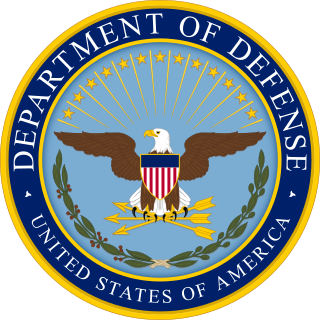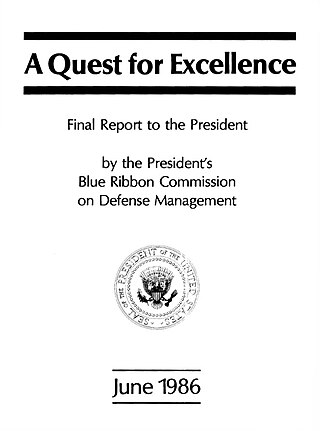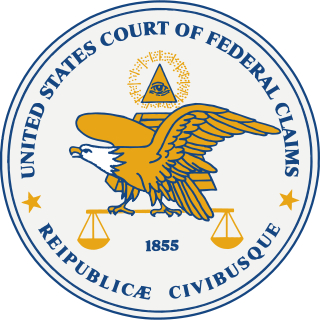
The Posse Comitatus Act is a United States federal law signed on June 18, 1878, by President Rutherford B. Hayes which limits the powers of the federal government in the use of federal military personnel to enforce domestic policies within the United States. Congress passed the Act as an amendment to an army appropriation bill following the end of Reconstruction and updated it in 1956, 1981 and 2021.
The minister of public services and procurement is the minister of the Crown in the Canadian Cabinet who is responsible for overseeing the Government of Canada's "common service organization", an expansive department responsible for the internal servicing and administration of the federal government. A flavour for the department is given by the list of acts and regulations for which it is responsible.
The Federal Acquisition Regulation (FAR) is the principal set of rules regarding Government procurement in the United States, and is codified at Chapter 1 of Title 48 of the Code of Federal Regulations, 48 CFR 1. It covers many of the contracts issued by the US military and NASA, as well as US civilian federal agencies.
In the United States, the processes of government procurement enable federal, state and local government bodies in the country to acquire goods, services, and interests in real property. Contracting with the federal government or with state and local public bodies enables interested businesses to become suppliers in these markets.

The Coast Guard Judge Advocate General oversees the delivery of legal services to the United States Coast Guard, through the Office of the Judge Advocate General in Washington, the Legal Service Command, offices in the Atlantic and Pacific Areas, nine Coast Guard Districts, the Coast Guard Academy, three training centers, and a number of other activities and commands. Legal services are delivered by Coast Guard judge advocates and civilian counsel in ten legal practice areas: criminal law/military justice, operations, international activities, civil advocacy, environmental law, procurement law, internal organizational law, regulations and administrative law, legislative support and legal assistance.
Systems Engineering and Technical Advisory (SETA) contractors are government contractors who are contracted to assist the United States Department of Defense (DoD) components, and acquisition programs. (In some areas of DoD, the acronym SETA refers to "Systems Engineering and Technical Assessment" contractors; also refers to "Systems Engineering and Technical Advisors.") SETA contractors provide analysis and engineering services in a consulting capacity, working closely with the government's own engineering staff members. SETA contractors provide the flexibility and quick availability of expertise without the expense and commitment of sustaining the staff long-term.

The United States Department of Defense is an executive branch department of the federal government of the United States charged with coordinating and supervising all agencies and functions of the U.S. government directly related to national security and the United States Armed Forces. As of June 2022, the U.S. Department of Defense is the largest employer in the world, with over 1.34 million active-duty service members, including soldiers, marines, sailors, airmen, and guardians. The Department of Defense also maintains over 778,000 National Guard and reservists, and over 747,000 civilians bringing the total to over 2.87 million employees. Headquartered at the Pentagon in Arlington County, Virginia, just outside Washington, D.C., the Department of Defense's stated mission is to provide "the military forces needed to deter war and ensure our nation's security".

Government procurement or public procurement is the procurement of goods, services and works on behalf of a public authority, such as a government agency. Amounting to 12 percent of global GDP in 2018, government procurement accounts for a substantial part of the global economy.
In U.S. Federal government contracting, IDIQ is an abbreviation of the term indefinite delivery/indefinite quantity. This is a type of contract that provides for an indefinite quantity of supplies or services during a fixed period of time. The legal origin of IDIQ contracts is the Federal Acquisition Regulation (FAR) section 16.504(a). IDIQs are also sometimes called "Task Orders" or "Delivery Order Contracts." IDIQ contracts are a subtype of Indefinite Delivery Contract (IDC), which is a "vehicle that has been awarded to one or more vendors to facilitate the delivery of supply and service orders."

The Project Bioshield Act was an act passed by the United States Congress in 2004 calling for $5 billion for purchasing vaccines that would be used in the event of a bioterrorist attack. This was a ten-year program to acquire medical countermeasures to biological, chemical, radiological, and nuclear agents for civilian use. A key element of the Act was to allow stockpiling and distribution of vaccines which had not been tested for safety or efficacy in humans, due to ethical concerns. Efficacy of such agents cannot be directly tested in humans without also exposing humans to the chemical, biological, or radioactive threat being treated, so testing follows the FDA Animal Rule for pivotal animal efficacy.

The President's Blue Ribbon Commission on Defense Management, informally known as the Packard Commission, was a federal government commission by President Ronald Reagan, created by Executive Order 12526 to study several areas of management functionality within the US Department of Defense. The commission was chaired by David Packard.
The Defence Production Sharing Agreement (DPSA) is a bilateral trade agreement between the United States and Canada that aims to balance the amount of military cross-border buying in order to avoid trade imbalances. Since its signing in 1956, it has led to a number of US companies sending military production to Canada in order to "offset" Canadian purchases of US military equipment. The Agreement has been amended on several occasions. The similar Defense Development Sharing Program organized sharing of military research and development.

The Biomedical Advanced Research and Development Authority (BARDA)' is a U.S. Department of Health and Human Services (HHS) office responsible for the procurement and development of medical countermeasures, principally against bioterrorism, including chemical, biological, radiological and nuclear (CBRN) threats, as well as pandemic influenza and emerging diseases. BARDA was established in 2006 through the Pandemic and All-Hazards Preparedness Act (PAHPA) and reports to the Office of the Assistant Secretary for Preparedness and Response (ASPR). The office manages Project BioShield, which funds the research, development and stockpiling of vaccines and treatments that the government could use during public health emergencies such as chemical, biological, radiological or nuclear (CBRN) attacks.

The Administration for Strategic Preparedness and Response (ASPR) is an operating agency of the U.S. Public Health Service within the Department of Health and Human Services that focuses preventing, preparing for, and responding to the adverse health effects of public health emergencies and disasters. Its functions include preparedness planning and response; building federal emergency medical operational capabilities; countermeasures research, advance development, and procurement; and grants to strengthen the capabilities of hospitals and health care systems in public health emergencies and medical disasters. The office provides federal support, including medical professionals through ASPR’s National Disaster Medical System, to augment state and local capabilities during an emergency or disaster.

Military acquisition or defense acquisition is the "bureaucratic management and procurement process", dealing with a nation's investments in the technologies, programs, and product support necessary to achieve its national security strategy and support its armed forces. Its objective is to acquire products that satisfy specified needs and provide measurable improvement to mission capability at a fair and reasonable price.
In government contracting, a Contract Adjustment Board is a department board at the Secretariat level in the U.S. Government that deals with disputes and requests for extraordinary relief under Public Law 85-804 of Aug. 28, 1958.

G.L. Christian and Associates v. United States is a 1963 United States Federal Acquisition Regulation (FAR) court case which has become known as the Christian Doctrine. The case held that standard clauses established by regulations may be considered as being in every Federal contract. Because the FAR is the law, and government contractors are presumed to be familiar with the FAR, a mandatory clause that expresses a significant or deeply ingrained strand of public procurement policy will be incorporated into a Government contract by operation of law, even if the parties intentionally omitted it.
The reserve components of the United States Armed Forces are military organizations whose members generally perform a minimum of 39 days of military duty per year and who augment the active duty military when necessary. The reserve components are also referred to collectively as the National Guard and Reserve.
The Competition in Contracting Act (CICA) of 1984, 41 U.S.C. 253, is United States legislation governing the hiring of contractors. It requires U.S. federal government agencies to arrange “full and open competition through the use of competitive procedures” in their procurement activities unless otherwise authorized by law. CICA was passed into law as a foundation for the Federal Acquisition Regulation (FAR) and to foster competition and reduce costs. The theory was that more competition for procurements would reduce costs and allow more small businesses to win Federal Government contracts. Under CICA all procurements must be competed as full and open so that any qualified company can submit an offer. The bidding procedure should take the form of sealed bidding, previously known as "formal advertising", solicited prior to 2001 through Commerce Business Daily.








